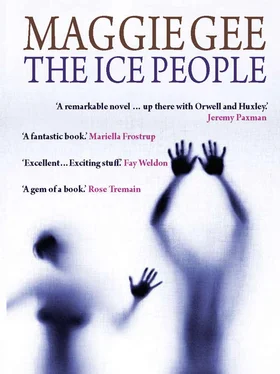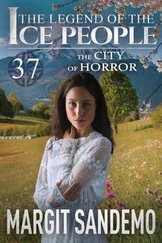Maggie Gee - The Ice People
Здесь есть возможность читать онлайн «Maggie Gee - The Ice People» весь текст электронной книги совершенно бесплатно (целиком полную версию без сокращений). В некоторых случаях можно слушать аудио, скачать через торрент в формате fb2 и присутствует краткое содержание. Год выпуска: 2008, Издательство: Telegram Books, Жанр: Фантастика и фэнтези, на английском языке. Описание произведения, (предисловие) а так же отзывы посетителей доступны на портале библиотеки ЛибКат.
- Название:The Ice People
- Автор:
- Издательство:Telegram Books
- Жанр:
- Год:2008
- ISBN:нет данных
- Рейтинг книги:4 / 5. Голосов: 1
-
Избранное:Добавить в избранное
- Отзывы:
-
Ваша оценка:
- 80
- 1
- 2
- 3
- 4
- 5
The Ice People: краткое содержание, описание и аннотация
Предлагаем к чтению аннотацию, описание, краткое содержание или предисловие (зависит от того, что написал сам автор книги «The Ice People»). Если вы не нашли необходимую информацию о книге — напишите в комментариях, мы постараемся отыскать её.
imagines an ice age enveloping the Northern Hemisphere. It is Africa’s relative warmth that offers a last hope to northerly survivors. As relationships between men and women break down, the novel charts one man’s struggle to save his alienated son and bring him to the south and to salvation.
Maggie Gee
The White Family
The Flood
The Ice People — читать онлайн бесплатно полную книгу (весь текст) целиком
Ниже представлен текст книги, разбитый по страницам. Система сохранения места последней прочитанной страницы, позволяет с удобством читать онлайн бесплатно книгу «The Ice People», без необходимости каждый раз заново искать на чём Вы остановились. Поставьте закладку, и сможете в любой момент перейти на страницу, на которой закончили чтение.
Интервал:
Закладка:
He said nothing, as usual, just stared straight ahead. ‘I miss her, you know,’ he said at last, quietly.
‘I miss Briony too, of course … But she wanted us to get there. She was dead set on it —’
‘I mean my mother ,’ he said, dryly, suddenly sounding alarmingly adult.
‘Oh. Yes. Sorry,’ We drove on for a few minutes in silence. ‘But you couldn’t go back,’ I had to say. ‘You could never go back to that Wicca nursery. You don’t regret it, do you? I mean … I did right?’
He stared out of the window at the field of flowers. I could smell the perfume faintly through the window. Dark Spanish lavender, heady, balsamy. I saw he wasn’t going to answer, and all my pentup frustration burst out. ‘They were turning you into a bloody woman! That was what your mother was doing to you!’
He flinched — when I shouted, people listened — but then he said, with studied indifference, ‘I just said, I miss my mother, that’s all.’
‘But are you glad we took you away?’ I think I might have hit him, if I hadn’t been driving, and I jerked the wheel violently to the left to stop us hitting a mangy black and white dog I hadn’t noticed, then hauled it with equal violence back again, and I’m afraid I also accelerated. Would no one ever see that I was a good man, trying to do my best for everyone?
The combination of the jerk and the shout had an unpredictable effect on Dodo, who was switched on by the jerk, and decided to answer, in her normal honeyed, encouraging voice. ‘Of course I’m happy we’re going out. I like it when you take me out.’
Luke switched her off with an impatient ‘Shut up … Look, you didn’t ask me at the time, did you?’ he said. ‘So don’t go asking me now, all right? I don’t just have to say what you want me to. I’m not Dora. I’m not a robot.’
I made myself calm down, and drove on. I was determined to get to Avila that day, and to my joy, it was still standing, Avila, where I had come as a student, with its little colonnaded square.
Life seemed to go on there remarkably as usual, shops still open, genuinely open, not operating behind barricades with furtive ‘Open’ notices on the shutters. The door of the church was locked, of course, but the roof was good; the stained glass had survived. When it came to the hour when decades ago the populace would have come out in their best clothes to promenade in the last of the daylight, to my astonishment, people still came, in their rusty blacks, their tight widows’ hairdos, men in jaunty hats catching the late red sun, little girls running in acidbright satin dresses which surely they had worn for ever … The only difference was that there were fewer children, but the old men drank dense yellow drinks under the pillars and the women chattered, harsh, humorous, and no one attacked us or threatened us. The little ones played skipping games on the flagstones, their shiny shoes tapping like a small light heart, and swifts came darting up into the twilight as they had done when I was young. It was summer in Avila, full golden summer.
Tentatively, we sat down at a table. A woman came and stared at us and brought us bread and wine and olives, which seemed no more expensive than before. We sat dumb, happy, silently eating. Luke watched a girl who was playing with her little sister, her long silky hair and her small breasts bouncing. I could see people looking at my battered face; no one had noticed it in the village, as if they had grown used to violence. But Avila was a place of peace. The waitress asked me if I needed a doctor; I fobbed her off — I didn’t feel like explaining — but I let her recommend an inn, and that night Luke and I slept in beds with sheets.
As I was slipping away, in my rough clean linen, enjoying the feel of it against washed skin, on the delicious edge of sleep, Luke suddenly spoke from the opposite corner.
‘Dad,’ he said. ‘This is nice. Isn’t it?’
‘Mmm,’ I mumbled, thick and slow.
After a moment he said, ‘I’m glad I’m here.’ I think it was his way of saying thank you. Or sorry, perhaps, or both, it didn’t matter.
‘Thanks for telling me —’ I said. I meant to say more, but while part of my brain was working it out, the rest got lost in drifts of warm feathers.
It was one of the last nights we spent together.
19
Driving through Spain, we drove through the seasons, from winter to summer, from the mountains to the sea, and for Luke, who had been so much confined, it was like seeing the whole world in a nutshell, from pinecovered mountains to bare red plains, from the lush green hills in the misty north to the burnt brown humps of baking Ronda, rolling down towards the glittering sea, and beyond the sea, beyond its white glaze, on the other side of the tongue of the Atlantic where the boats darted like lizards across the light — across that strait was Africa. And the boats were still sailing. The boats were still sailing .
I thought I could see Africa.
‘Look, you can see it, if you screw up your eyes,’ I told him, excited, ‘Over there —’ There was the faintest line, the smallest shadow, faintly purple on the far horizon where sky met sea in a shimmer of heat.
‘Maybe,’ he grunted, and turned away. I thought it was too much for him, to see it in reality, the land of dreams, so I said no more, and patted his shoulder.
It was damp with sweat. Unbelievable. There was heat again, we smiled, we expanded, we felt we had been cold for half a lifetime and never wanted to be cold again. The hills were singing with heat and crickets and thyme and marjoram and magic, and I drove faster, though the roads were narrow, I was rally driving and showing off till we nearly died on a hairpin bend. Then I sobered up. I wanted to get there. Having risked so much, I had to get Luke through.
In the back of the car was the brown dispatch case that held our precious documents. When we left the car they nearly always came with us, but inside I kept the case wrapped in a dirty towel, obsessed with the possibility that thieves would ambush us and snatch it, thinking it held our money. Every time we stopped, I would check on it, a corner of green underneath the oilcan. And it was still there. We would be all right .
I was overtired, and overexcited, and the edges of things were playing queer tricks on my eyes. It was age, or possibly the heat haze. I asked Luke to drive, and he took over happily. Not long now, a day, two weeks, depending on what we found on the coast. Spain had once been famous for bureaucracy, but I knew we had everything they could ask for –
They suddenly ran across the road in front of us, making Luke swerve and shout in fear, then slow down to watch them, but they were soon gone, though one gazed after us for a moment. He was brown as earth. His arms had sharp muscles. White whites to his eyes. He was laughing at us.
‘They must be the salvajes ,’ Luke said. ‘I’ve never seen them up close before. The wild boys. There was a girl, as well. Did you see, they were throwing lemons at each other?’
‘Trying to kill each other, more like,’ I interrupted sourly. ‘Keep your eyes on the road. It’s steep. What did you call them?’
‘ Salvajes … that’s what the girl in the village called them.’ He’d begun to know things I didn’t know. ‘They were having such fun,’ he said, obstinately, and I found myself thinking, has he had enough fun, as an only child, and then with the coven?
‘From what I hear, they’re to be avoided. Not very nice,’ I said firmly.
‘What’s so bad about them?’ he asked.
I sometimes forgot he was still a child. I fell back on pious psychology. ‘It’s because they grew up without decent parents. They never lived in a family, like you did. So — anything goes, for them.’
Читать дальшеИнтервал:
Закладка:
Похожие книги на «The Ice People»
Представляем Вашему вниманию похожие книги на «The Ice People» списком для выбора. Мы отобрали схожую по названию и смыслу литературу в надежде предоставить читателям больше вариантов отыскать новые, интересные, ещё непрочитанные произведения.
Обсуждение, отзывы о книге «The Ice People» и просто собственные мнения читателей. Оставьте ваши комментарии, напишите, что Вы думаете о произведении, его смысле или главных героях. Укажите что конкретно понравилось, а что нет, и почему Вы так считаете.












